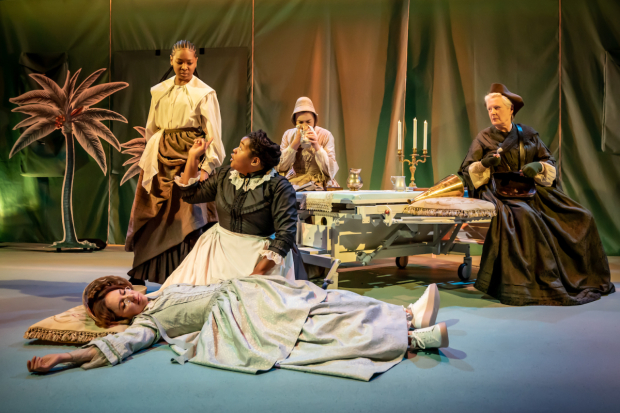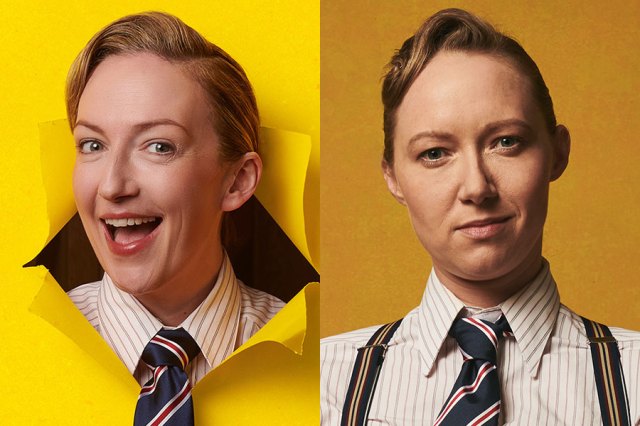
© Marc Brenner
There are perfect well-made plays. Then there are plays that thrill and incite, refusing to accept simple, neatly-tied solutions. Jackie Sibblies Drury's Marys Seacole is wild, brave, and absolutely riveting. It doesn't accept any easy options and I utterly loved it.
This is the second of Sibblies Drury's plays produced here, following on from 2019's Pulitzer Prize-winning Fairview, staged by the same creative team including director Nadia Latif and designer Tom Scutt. Although marginally more conventional than that incendiary drama – which ended with the white audience up on stage – Marys Seacole shares the same capacity to detonate audience expectations, swinging from the wildly comic to the furious and fiercely argued in a hair's breadth.
Its ostensible subject is Mary Seacole, pioneering Jamaican nurse, who ran a hotel for sick travellers before heading out to the Crimean War to offer medical assistance to the British Army. We learn the outline of her story and her own view of herself when Kayla Meikle stands on stage in the first scene, in stern Victorian black, and tells us her own, sanitised view of her life.
But then, in front of Scutt's simple set of lines of giant scrub-coloured fabric, with pockets and zips, something strange begins to happen. Mary is handed a bluetooth earpiece by a mysterious powerful figure called Duppy Mary (Llewella Gideon). Gradually her outfit is stripped away to reveal the uniform of an NHS worker, who is caring for an infirm white woman, Merry (Susan Wooldridge), whose shrill daughter May (Olivia Williams) is both moaning about how much work she has to do, and quick to castigate Mary for her lack of care. "Basic human compassion – that's all I'm asking for."
Yet it is Mary and her assistant Mamie (Déja J Bowens, making a wonderfully vivid professional debut) who clean Merry's bed after she has an accident. May and her bored teenage daughter Miriam (Esther Smith) bolt from the scene at the first sign of real mess and distress.
These six women then become the protagonists of a series of different scenes, travelling through time, from today's NHS to a park bench in New York, to the Crimea where mutilated bodies suddenly rain from the sky. All explore similar themes: why do black women have to leave their own children to raise the children and care for the infirm mothers of richer white women? Why do their own mothers think that will give them a better life? Who are the real mothers and what value does the love they give possess?
The play could not feel more topical, even though it was written in 2018, long before a war once again broke out near to the Crimea, or before the Windrush generation of carers found their service under-valued. But it is the universality of its concerns that give it such fighting power: the way it argues, almost with itself, about how much black women can define their own lives in the face of a racism that overwhelms them.
There's anger as an underlying note, particularly in the powerful speeches of Duppy Mary, given elemental force by Gideon. But there's a lot of humour too. The conversations between Mary and Mamie are a subtle joy. The women who are happy to see others care for their families are brilliantly depicted by Williams, screeching down her phone while fixing her (invisible) daughter with fierce eyes, but also by Smith as a young mother who elicits compassion even while she is rattling insensitively on about her holiday in Jamaica. Williams, superbly sharp throughout, also turns up as Florence Nightingale, dripping with contempt as bright as the lamp she holds in her hand, anxious to erase Seacole's efforts from the narrative.
The action is broad-ranging and massively varying in tone. What holds the piece together, apart from the sheer questing intelligence of the writing, is Latif's controlled direction and a performance of extraordinary range and power from Meikle. Both dignified and comic, doubting and assured, her kindly, thoughtful presence gives this bold, brilliant play its centre and its emotional heart.













